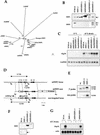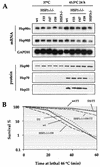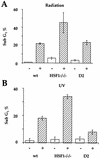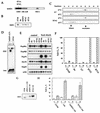Activation of heat shock genes is not necessary for protection by heat shock transcription factor 1 against cell death due to a single exposure to high temperatures
- PMID: 12897157
- PMCID: PMC166333
- DOI: 10.1128/MCB.23.16.5882-5895.2003
Activation of heat shock genes is not necessary for protection by heat shock transcription factor 1 against cell death due to a single exposure to high temperatures
Abstract
Heat shock response, which is characterized by the induction of a set of heat shock proteins, is essential for induced thermotolerance and is regulated by heat shock transcription factors (HSFs). Curiously, HSF1 is essential for heat shock response in mammals, whereas in avian HSF3, an avian-specific factor is required for the burst activation of heat shock genes. Amino acid sequences of chicken HSF1 are highly conserved with human HSF1, but those of HSF3 diverge significantly. Here, we demonstrated that chicken HSF1 lost the ability to activate heat shock genes through the amino-terminal domain containing an alanine-rich sequence and a DNA-binding domain. Surprisingly, chicken and human HSF1 but not HSF3 possess a novel function that protects against a single exposure to mild heat shock, which is not mediated through the activation of heat shock genes. Overexpression of HSF1 mutants that could not bind to DNA did not restore the susceptibility to cell death in HSF1-null cells, suggesting that the new protective role of HSF1 is mediated through regulation of unknown target genes other than heat shock genes. These results uncover a novel role of vertebrate HSF1, which has been masked under the roles of heat shock proteins.
Figures









References
-
- C. N. Adra, P. H. Boer, and M. W. McBurney. 1987. Cloning and expression of the mouse pgk-1 gene and the nucleotide sequence of its promoter. Gene 60:65-74. - PubMed
-
- Aschoff, J., and U. von Saint Paul. 1973. Brain temperature as related to gross motor activity in the unanesthetized chicken. Physiol. Behav. 10:529-533. - PubMed
-
- Beere, H. M., B. B. Wolf, K. Cain, et al. 2000. Heat-shock protein 70 inhibits apoptosis by preventing recruitment of procaspase-9 to the Apaf-1 apoptosome. Nat. Cell Biol. 2:469-475. - PubMed
Publication types
MeSH terms
Substances
LinkOut - more resources
Full Text Sources
Molecular Biology Databases
